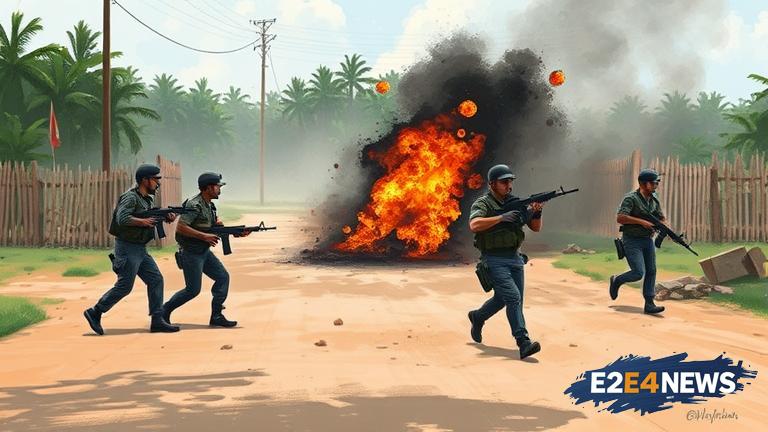The ongoing clashes between Thailand and Cambodia have entered their fourth day, with both sides exchanging artillery fire and blaming each other for the escalation. The conflict, which began on February 4, has resulted in the deaths of several soldiers and civilians, and has displaced hundreds of people living in the border areas. The two countries have a long-standing dispute over the demarcation of their shared border, with Cambodia claiming that Thai troops have encroached on its territory. Thailand, on the other hand, maintains that its troops are simply defending the country’s sovereignty. The clashes have sparked concerns over regional stability, with the Association of Southeast Asian Nations (ASEAN) calling for an immediate ceasefire and urging both sides to engage in dialogue. The United States, China, and other international powers have also weighed in, urging restraint and a peaceful resolution to the conflict. Despite the international pressure, the fighting continues, with both sides dug in and refusing to back down. The Thai military has deployed additional troops to the border area, while Cambodia has accused Thailand of using excessive force and violating its sovereignty. The conflict has also had a significant impact on the local population, with many residents forced to flee their homes and seek shelter in nearby towns and cities. The humanitarian situation is becoming increasingly dire, with reports of food and water shortages, as well as a lack of medical supplies. The international community is urging both sides to allow humanitarian aid to reach those affected by the conflict. The clashes have also raised concerns over the potential for the conflict to spread to other parts of the region, with neighboring countries watching the situation closely. The economic impact of the conflict is also being felt, with trade and tourism between Thailand and Cambodia grinding to a halt. The Thai government has announced plans to evacuate its citizens from Cambodia, while the Cambodian government has accused Thailand of attempting to strangle its economy. The conflict has also sparked a wave of nationalism in both countries, with protesters taking to the streets to demonstrate their support for their respective governments. The situation remains volatile, with the potential for further escalation still very real. As the international community continues to call for calm, the people of Thailand and Cambodia can only wait and hope that a peaceful resolution can be found. The conflict has highlighted the need for greater cooperation and dialogue between the two countries, and the importance of finding a lasting solution to the border dispute. The ASEAN regional bloc has offered to facilitate talks between the two sides, but so far, there has been little progress. The United Nations has also urged both sides to engage in peaceful negotiations, but the situation on the ground remains tense. The people of Thailand and Cambodia deserve a peaceful and stable future, and it is the responsibility of their governments to work towards that goal. The international community must continue to pressure both sides to engage in dialogue and find a peaceful resolution to the conflict. Only through peaceful means can the people of Thailand and Cambodia hope to achieve a lasting and stable peace.
